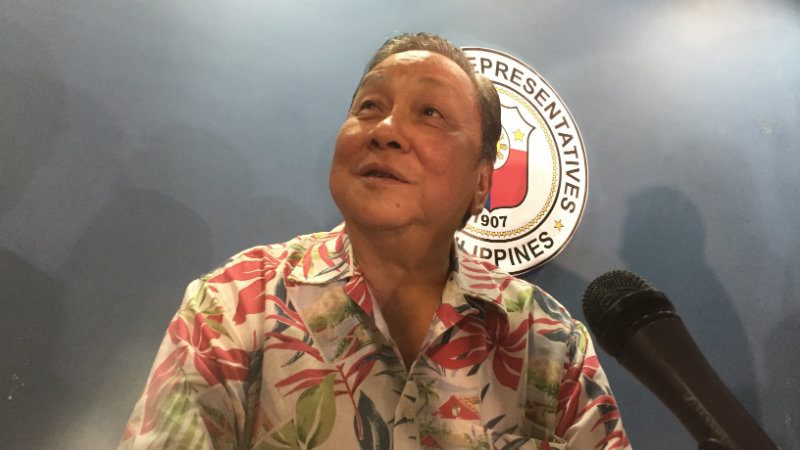SUMMARY
This is AI generated summarization, which may have errors. For context, always refer to the full article.

He was a long-time member of the Liberal Party (LP) and a vocal critic of the late dictator Ferdinand Marcos.
So during a wedding reception sometime in 2003, then Manila mayor Lito Atienza was understandably surprised when Marcos’ widow, Imelda, confided that she wanted to return some “7,000 tons” of gold back to the Philippines.
“Narinig ko na yan directly from Congresswoman Imelda Marcos when I was mayor. Sabi niya, gusto ko ibalik ang gold dito, ibalik sa gobyerno yan para mabawi lahat ng utang natin,” said Atienza, now a representative of Buhay party list in the House, during a Wednesday, August 30, press conferece.
(I heard it directly from Congresswoman Imelda Marcos when I was mayor. She said she wanted to return the gold, return it to the government so they could pay off their debts.)
The problem was, Atienza recalled Marcos saying, a “super power” was in the way. Atienza did not say which super power this was.
Immediately after Imelda confided in him, Atienza recalled, her daughter Imee told him not to believe her own mother’s words.
Asked why he thought Imelda would confide in him, of all people, Atienza said it seemed like she was trying to reach out to the Philippine government to help her facilitate the return of the gold.
The Marcos ill-gotten wealth issue has made headlines again after no less than President Rodrigo Duterte, in a speech, claimed that a Marcos “spokesman” told him about the willingness of the family of the late dictator to return some of their wealth to the country.
It’s a rather odd statement given that neither Imelda nor Marcos’ heirs have admitted to stealing from the government’s coffers during the late strongman’s rule. They have also questioned – sometimes rhetorically – why they are being asked to apologize for abuses during the dictator’s rule.
Tens of thousands have filed human rights abuse claims before the Human Rights Victims’ Claims Board. Cases seeking to seize the riches of the Marcoses are also pending in courts both here and abroad.
Atienza, a member of the House minority, said he hopes Duterte would be able to broker the deal. “Wag na natin usisain dahil wala naman na pro-prosecute. Kunin na lang natin (Let’s not scrutinize it anymore because nobody gets prosecuted. Let’s just get the gold back),” he said.
Kabayan Representative Harry Roque, also a member of the minority, had the same sentiments. “Bagamat ninanais natin na magkaroon ng pananagutan doon sa mga nagnakaw sa ating bayan, ang katotohanan ay matapos ang tatlumpu’t isang taon ay mukhang mabibigo tayo na mapakulong ang kahit sino doon sa nangyaring kleptocracy noong nakaraang rehimen ng diktadura,” he said.
(Although we want accountability from those who stole from our coffers, the truth is that after almost 31 years, it seems like we will fail to jail any of those responsible for the kleptocracy that happened during the dictatorship.)
Roque wants a “truth commission” to find out the extent of the Marcos’ thievery.
The late president Cory Aquino, who replaced Marcos after the People Power uprising, created the Presidential Commission on Good Government, specifically to take back the Marcos’ stolen wealth.
During the Wednesday press conference, Atienza and Roque sandwiched Quezon 3rd district Representative and minority leader Danilo Suarez. When asked about Duterte’s apparent talks with a Marcos emissary, Suarez was first to admit that he’s a Marcos loyalist.
“Ako ay anti-Marcos talaga, nag-aantay ako na bumalik si Marcos noong araw (I’m anti-Marcos. I was waiting for Marcos to come back before),” he quipped. The minority leader said the Bangko Sentral ng Pilipinas could prove or disprove whether the gold owned by the Marcoses was acquired legally or otherwise.
In the waning years of his last term as president, Marcos placed the entire country under Martial Law because of the supposed threat posed by the communist insurgency. He immediately jailed his political enemies, closed Congress, and appointed his loyalists to key government posts.
The Marcos era, claimed by loyalists to be among the country’s most prosperous years, is marred by human rights abuses and plunder of government funds. Data has also shown that the Philippine economy plummeted during and after the strongman’s rule. – Rappler.com
Add a comment
How does this make you feel?
There are no comments yet. Add your comment to start the conversation.